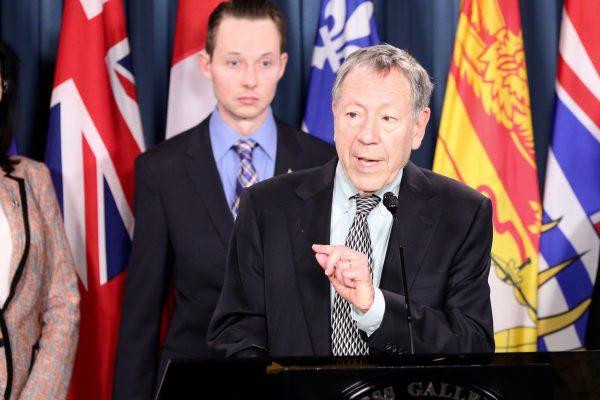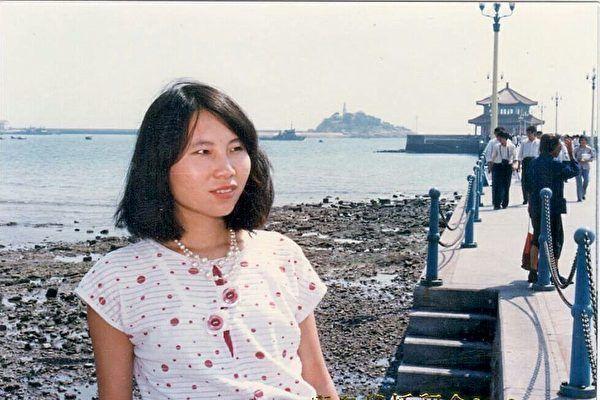Canada should demand the immediate release of Sun Qian, a Canadian citizen and Falun Gong adherent imprisoned in China for her faith, says former Liberal justice minister Irwin Cotler.
Sun was arrested at her Beijing residence in February 2017 and has been held in custody ever since. On June 30 she was sentenced by a Beijing court to eight years in prison for practising Falun Gong.
Sun had recently renounced her Canadian citizenship and is suspected of giving a coerced confession under prolonged torture while in police custody.
“The Canadian government should still see her as a Canadian citizen, should call for her immediate release, and for the Chinese authorities to cease and desist from all forms of torture and abuse,” Cotler, a former Attorney General of Canada and an expert on human rights law, said in an interview.
Cotler, who has worked on Sun’s case, says her sentence violates China’s own constitution—which stipulates freedom of religious belief—and also violates international treaties to which China is a part.
“We’re not asking [Beijing] to respect Canadian law. We’re asking them to respect their own law and to respect international treaties to which they are a state party,” he said.
“[Sun’s] case is a classic case of the criminalization of innocence … not for anything she has done, but for who she is: the bearer of the values of truth and compassion and tolerance, which reflect and represent the values of the Falun Gong community.”

Former MP and justice minister Irwin Cotler speaks at a press conference in support of efforts to secure the release of Canadian citizen Qian Sun detained in China for her practice of Falun Gong, on Parliament Hill in Ottawa on May 9, 2017. Jonathan Ren/NTD Television
Sun has been represented by nearly a dozen lawyers since her arrest, all of whom had to drop her case due to pressure from the authorities. Since 2019, she has been allowed to only use a government-designated lawyer, who could at best ask for leniency rather than argue for her innocence.
The Falun Dafa Association of Canada says Sun has been subjected to prolonged physical and mental torture in detention, including being shackled to a steel chair, pepper-sprayed in the face, and subjected to sustained brainwashing and psychological manipulation.
Sun’s former lawyer Xie Yiyan said she was mentally manipulated to the point where she decided to donate her wealth—hundreds of millions of dollars—to the detention centre where she was being held.
“Sun Qian basically has given up everything. However, she did so while detained and without being free. Legally, it shouldn’t be valid because it is not an expression of her free will,” Xie said.
Before her arrest, Sun was the founder and vice-president of Beijing Leadman Biochemistry, a multimillion-dollar company she co-owned with her husband, Shen Guangqian.
Sun’s sister, Sun Zan, told The Epoch Times in previous interviews that Shen colluded with Chinese officials to have Sun incarcerated so that he could take over her shares in the company.
Beijing’s Retaliation
Xie Yiyan has said Sun’s June 30 sentencing is directly related to the Meng Wanzhou extradition case—which came a month after the British Columbia Supreme Court dismissed a bid by Meng to be released, and just days after Prime Minister Justin Trudeau rejected calls to release the Huawei CFO, arrested in Canada on a U.S. extradition request.Since Meng was arrested in Vancouver in December 2018, Beijing has engaged in a “retaliatory pattern,” says Cotler. This includes the arrest of Canadians Michael Kovrig and Michael Spavor; the death sentence of Robert Schellenberg, a Canadian arrested in China on a drug smuggling charge; and trade sanctions on Canadian agricultural exports.
This pattern of aggressive behaviour, he notes, is part of Beijing’s overall strategy to intimidate anyone who it perceives as a threat and use violence to repress them—such as Hong Kong democracy activists or members of the Uighur Muslim minority.
“What we see here has been a retaliatory pattern … but we should also see it as part of a massive repression by Chinese authorities down the line,” Cotler said. “As we speak, we are seeing horrific collective actions and massive repression being undertaken by the Chinese authorities.”
However, as more countries wake up to the China threat and band together amid fallout from the pandemic, it weakens Beijing’s ability to intimidate and isolate single countries that criticize it, he explains.
“[Beijing] will seek their bullying of each of the individual countries one by one, but will have to deal with a collectivity [in response]. And that will, in effect, provide a kind of justice and accountability in relationships with China,” said Cotler, adding that democracies could unite through trade sanctions against China or moving supply chains out of China.
“If the community of democracies and beyond come together and say ‘that’s it, that’s enough’—we can redefine our relationships as a collectivity. I think then things will begin to change. And maybe that will be the beginning of the movement towards the proper normalization of relations between the international community and China.”
With reporting by Limin Zhou





